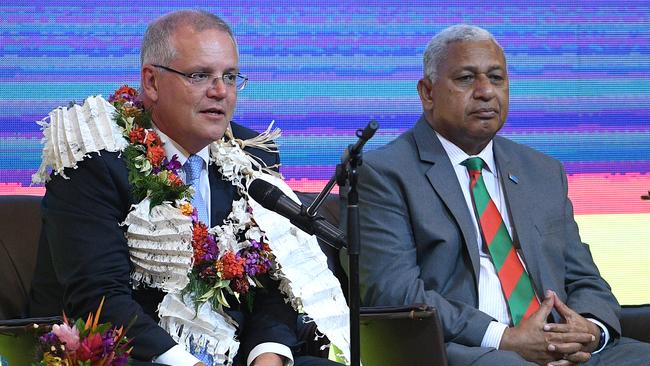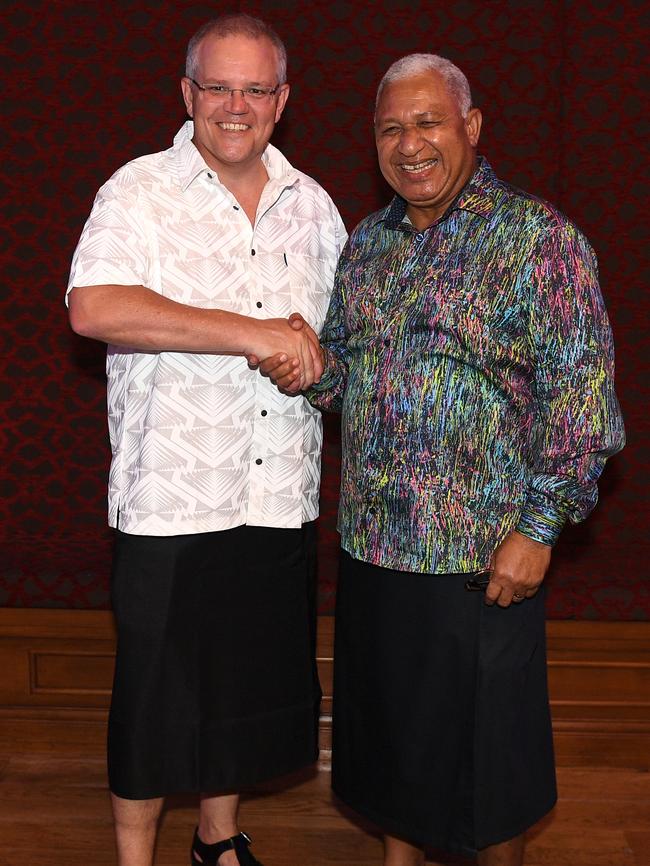Clean energy debate: Scott Morrison hits back after Fiji lecture
Scott Morrison defends the government’s clean energy position after his Fiji counterpart lectured him on the issue.

Scott Morrison has defended his government’s position on clean energy and his $300 million investment in Pacific nations’ capacity to tackle climate change, after his Fijian counterpart lectured him on the issue.
Fiji Prime Minister Frank Bainimarama used a state dinner honouring the Prime Minister last night to call on Australia to do more to transition towards renewables, and said he made the same warnings to Malcolm Turnbull.
Mr Morrison today said Australia had kept his commitments but would focus his climate policies on direct action in the Pacific rather through global funds.
“We keep our commitments as Australia, and we have made solid commitments when it comes to emissions reduction, and we have been keeping them and we will keep them,” he said.
“We have already made financial commitments, some $200 million already invested, $100 million further, here and in Fiji alone most recently.
“And into the future we will continue to fund these resilient works in the Pacific, and we’ll do it directly.
“As I’ve said, we won’t be doing it through global climate funds or anything like that, we’ll be doing it directly in our ongoing programs to support climate change resilience works and preparedness here in the Pacific”
In Vanuatu on Wednesday, Mr Morrison promised Pacific nations Australia would directly fund projects tackling the impact of climate change. But he said Vanuatu’s leaders had not asked Australia to do more to curb emissions.

Bainimarama repeats warning
Mr Bainimarama said he had discussed Australia’s transition towards renewables with Mr Turnbull.
“I urged your predecessor repeatedly to honour his commitment to clean energy,” he told the state dinner.
“From where we are sitting, we cannot imagine how the interests of any single industry can be placed above the welfare of Pacific peoples and vulnerable people in the world over.”
Mr Morrison is on the last day of his three-day Pacific tour which has been dominated by rare bilateral meetings with Island nation leaders, concerns about China’s rising influence in the region and a well-received decision to relax rules on the importation of kava to Australia.
But the issue of climate changes is a pressing one in the Pacific Islands and leaders there have long urged major world powers to do more to tackle global warming.
“I pay respect in particular to Mr Bainimarama’s international leadership on climate change and oceans,” Mr Morrison said at last night’s dinner.
“You have heard him speak passionately about this this evening and it was that same passion he took into the leadership of the COP process over the past 12 months.”
In Vanuatu on Wednesday, Mr Morrison promised Pacific nations Australia would directly fund projects tackling the impact of climate change. But he said Vanuatu’s leaders had not asked Australia to do more to curb emissions.
Mr Bainimarama said the evidence of climate change was clear in the disappearing coastlines in Bangladesh and worsening flooding in the United States, and also invoked the current heatwave on Australia’s east coast.
“Fijian farmers are watching their crops perish in soil that has been spoiled by the heightened salinity that is associated with sea level rise,” he said.
“And in Australia as well, where soaring temperatures have reached record highs in several major cities just this week,” he said.
Bill Shorten said the Fiji Prime Minister had embarrassed Mr Morrison and that the government has “no climate change policy.”
“It’s embarrassing that he had to go to Fiji to be told that he’s doing nothing on climate change, when in fact millions of Australians could have told him that in Australia,” he said.
“We have no climate change policy. I mean, the Fijians have got YouTube and the internet, and they’ve just looked up the pictures of Mr Morrison brandishing coal like some lucky charm in Parliament in question time, turning it into show-and-tell time for primary school students.”




